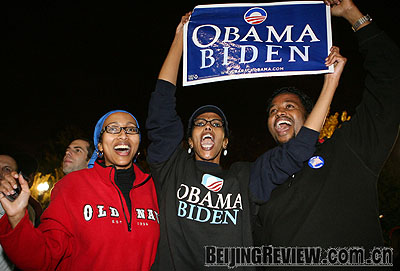|

STAUNCH SUPPORT: Americans all over the world celebrated Barack Obama's victory
Packed into a Beijing cafe on November 5, 6,000 miles and 16 hours away from the U.S. presidential election, the crowd excitedly began counting down the seconds until West Coast polls closed: 10, 9, 8 Earlier voter surveys had shown Barack Obama would win California, Oregon and Washington by wide margins. Together with the states he had already won, these states would give him more than enough electoral votes. As soon as the countdown ended, up flashed on the TV screen: "Barack Obama Elected President."
It was a very different scene on Election Day 2004. I was at university in Canada, where we gathered in the campus bar to watch the results. For people who hoped Americans would vote President George W. Bush out of office, it was a disappointing evening. I could feel the cold, accusing stares from the Canadians around me each time a state on CNN's electoral map turned red for Bush.
By the next morning, when Bush's victory was clear, discussion had already turned to what would happen in 2008. American presidential elections are years-long affairs-Obama formally announced his candidacy in February 2007, followed by John McCain two months later. They campaigned for well over a year before they officially became their party nominees.
Last spring I followed the Democratic and Republican primary elections with my students, who were leaving China to study in the United States. We watched American television news every day as the fight for the Democratic nomination dragged into June. English class became civics class as I explained that Americans don't actually elect their president directly. "Electoral college" and "superdelegate" went up on the chalkboard as new vocabulary words. It was among my proudest moments as a teacher when a student sent me a text message to say Hillary Clinton had won the Pennsylvania primary.
So when it came time to vote in the general election, I wanted to be ready and assist others as well--no matter whom they were voting for. Requesting an absentee ballot can be a confusing process, especially if you can't remember your Chinese address. Each state has different rules, requirements and, most importantly, deadlines, sneaking up on some overseas Americans a full month before the election.
I signed up to volunteer for Democrats Abroad. We set up at laowai hangouts around town and scoured the surrounding neighborhoods for any voting-age American we could find. It was a little intimidating at first to step out into the streets of Sanlitun, clipboard in hand, and canvass voters: "Excuse me, are you a U.S. citizen? Hi, are you American?" The responses I got mostly fell into five categories:
1. "Yes, but I'm already registered."
2. "Yes, but I'm just visiting China."
3. "Hell no."
4. Obvious incomprehension, followed by a response in another language.
5. "Where can I buy that Obama T-shirt you're wearing?"
Occasionally, however, I encountered someone who wanted to vote but didn't know how, or who was fretting because his or her absentee ballot hadn't arrived yet. "No problem--come with me," I'd say. "So, where are you from?" It turns out the United States is well represented in China. I met Americans from all corners, from Wisconsin to Hawaii to Washington, D.C. We even registered an Obama supporter from Wasilla, Republican vice presidential candidate Sarah Palin's tiny Alaska hometown.
For Americans abroad, the U.S. election was an instant conversation starter, something to bond over. It also reignited my long-dormant patriotism. Watching the presidential debates had an entirely different meaning here than it would have at home. Sure, the candidates were pandering to undecided voters and distorting their records, but they were my pandering candidates, and watching them contort themselves into every possible position to win over Joe the Plumber filled me with absolute pride.
Watching the election from abroad, away from emotionally charged political rallies and constant cable news commentary, also gave us a broader perspective. Here it is actually possible for Americans on opposing political sides to have a reasonably calm discussion. We may not see eye to eye on much else, but we can agree that the divisiveness in American politics has to change.
Likewise, McCain and Obama agree that America's reputation has suffered in the last eight years. Hopefully President-elect Obama will be able to repair some of the damage. The world is certainly rooting for him. A China Daily online poll showed that 75 percent of Chinese people support Obama, while an online poll by The Economist estimated that in a "global electoral college," Obama would win every country but four.
The long, long presidential election is over. Americans in China, thank you for voting. But don't tune out just yet: The 2010 midterm election is just around the corner. | 